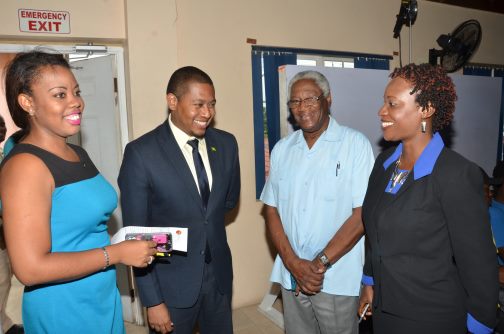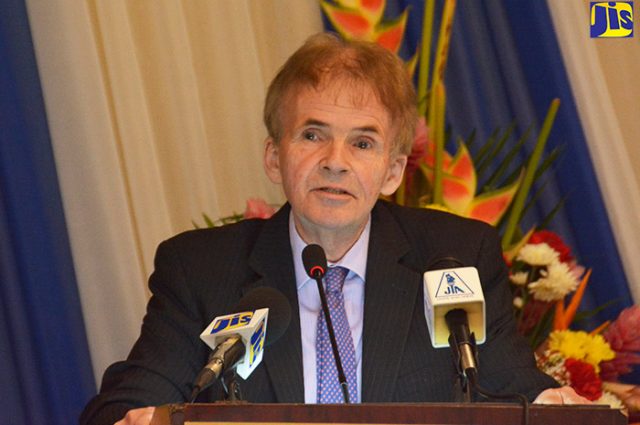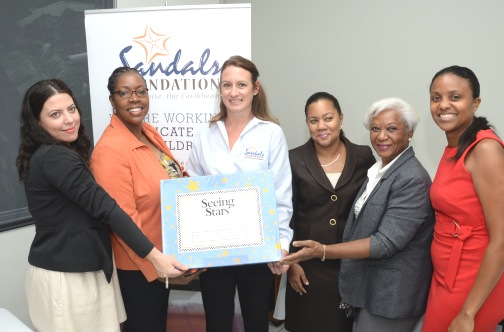JIS: FIFTY early childhood and special needs teachers across the island last week participated in a Lindamood-Bell Learning Processes Workshop, which sought to better equip teachers with the techniques and resources needed to educate students with special learning needs.
The four-day workshop, held at Hillel Academy in Kingston, was facilitated by the Sandals Foundation and funded by the CHASE (Culture, Health, Arts, Sports and Education) Fund.
According to organisers, for nearly 30 years, the Lindamood-Bell Learning Centers have used intensive, research-validated instruction to strengthen the sensory-cognitive functions needed for reading and comprehension, which has proven successful for individuals with learning challenges, including dyslexia, ADHD (Attention-deficit/hyperactivity disorder), and autism.
The introduction of the programme to the island was the brainchild of Mandy Melville, the parent of a child with dyslexia, who later secured the help of the Sandals Foundation and the Chase Fund to widen the scope of the project.
… I used to have to take him away during holidays for two weeks to do this type of lesson at their centres in Miami, so every year we’d go away [but] one of the things that hit me is he said to me recently, ‘mummy, why am I the only child that has to go away for extra lessons’, so you know we explain but it’s hard when they are young,” she told the Jamaica Observer.
“During his mock exams for GSAT (Grade Six Achievement Test) we saw the results of this intervention where he was getting 80s and then 90s in his mock exams for Language Arts and Communication Task, which are his weak subjects, so with that his teachers asked what we were doing and became interested in the programme,” she continued.
Melville explained she called to enquire if the programme would be able to facilitate sending a few of their teachers to the island where she was told that they would send some teachers to facilitate a group of 50. It was at this point, Melville said, she made contact with the Sandals Foundation to get help with finding more teachers to be a part of the programme.
“I feel very excited and very proud of the teachers because they are so excited, it’s one thing they sign up for a course but they are here and it shows that they are willing to learn, some of them were already on holiday but have taken the time to be here, so it shows that they are committed and ready to do this,” Melville stated.
According to director of programmes at the Sandals Foundation, Heidi Clarke, the notice was put out that a workshop was being held to which they received ‘hundreds of applications’ from teachers, but a designated panel selected 50 participants, based on certain criteria. She noted that the influx of applications demonstrated the great need for more workshops of this nature for special needs educators.
“… As we continue to make strides in the Jamaican educational system, programmes such as these will help [equip educators to work with] students with varied educational needs as it is a great step in providing children the learning environment they need to flourish. I would like to thank everyone who came on board to make this workshop possible,” Clarke said in her remarks.
One of the workshop participants, Shakera Roberts, expressed appreciation for the opportunity extended to the teachers, especially to the sponsors for covering the cost of not only the workshop itself but the extra resources in the forms of kits provided.
“Being trained by the Lindamood-Bell Learning Processes will greatly assist my fellow Jamaican teachers to be more equipped with effective methodologies to facilitate students with special needs to learn to their full potential. There needs to be greater awareness that persons with special needs have the ability and can indeed contribute significantly to their growth, well-being and the society,” said Roberts, a resource teacher at New Providence Primary School.
Minister of State in the Ministry of Education, Youth and Information Floyd Green offered the ministry’s endorsements for the implementation of the programme, which he said will help to contribute and refine the existing methodologies employed by the teachers in order to unlock a student’s full potential.
“You can be assured of our full support, our collaborative work here must be to the benefit of our children even as we draw from the best practices of elsewhere and apply our unique perspective. We depend on all of you in the field and we want to make it clear we don’t have all the answers, so feel free to share with the ministry where you think we can do more, the areas you want to see urgent interventions. You are out in the field, you are facing the children daily and I know you want to see us do better and we can do better through partnerships like this,” the Minister said.
CAPTION: Lindamood-Bell professional presenters, Mary McDonald (left) and Tracey Hall (second left); director of programmes at the Sandals Foundation, Heidi Clarke; representative from the Ministry of Education’s Special Education Unit, Christiana Addington; project manager at the CHASE Fund, Paulette Mitchell; and chairman of the Early Childhood Commission, Trisha Williams-Singh pose with one of the special education learning resource kits which was presented to each participant at the four-day Lindamood-Bell Learning Processes Workshop at Hillel Academy in Kingston, last week.









